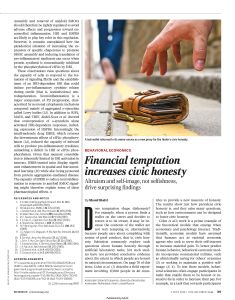Join getAbstract to access the summary!

Join getAbstract to access the summary!
Shaul Shalvi
Financial Temptation Increases Civic Honesty
Altruism and self-image, not selfishness, drive surprising findings
Science, 2019
What's inside?
Faced with temptation, humans are more honest than you might expect.
Recommendation
Are humans naturally inclined to be altruistic or selfish? It’s an age-old question that modern researchers are now trying to answer with scientific methods. Shaul Shalvi writes about a new field experiment on human honesty whose results came as a positive surprise to both economists and laypeople. His article is one you will remember long after reading it – and especially if, sometime in the future, you find yourself debating what to do with that cash-filled wallet you found on the street on your way to work.
Summary
About the Author
Shaul Shalvi is professor of psychology at the Department of Experimental and Political Economics at the University of Amsterdam.

















Comment on this summary